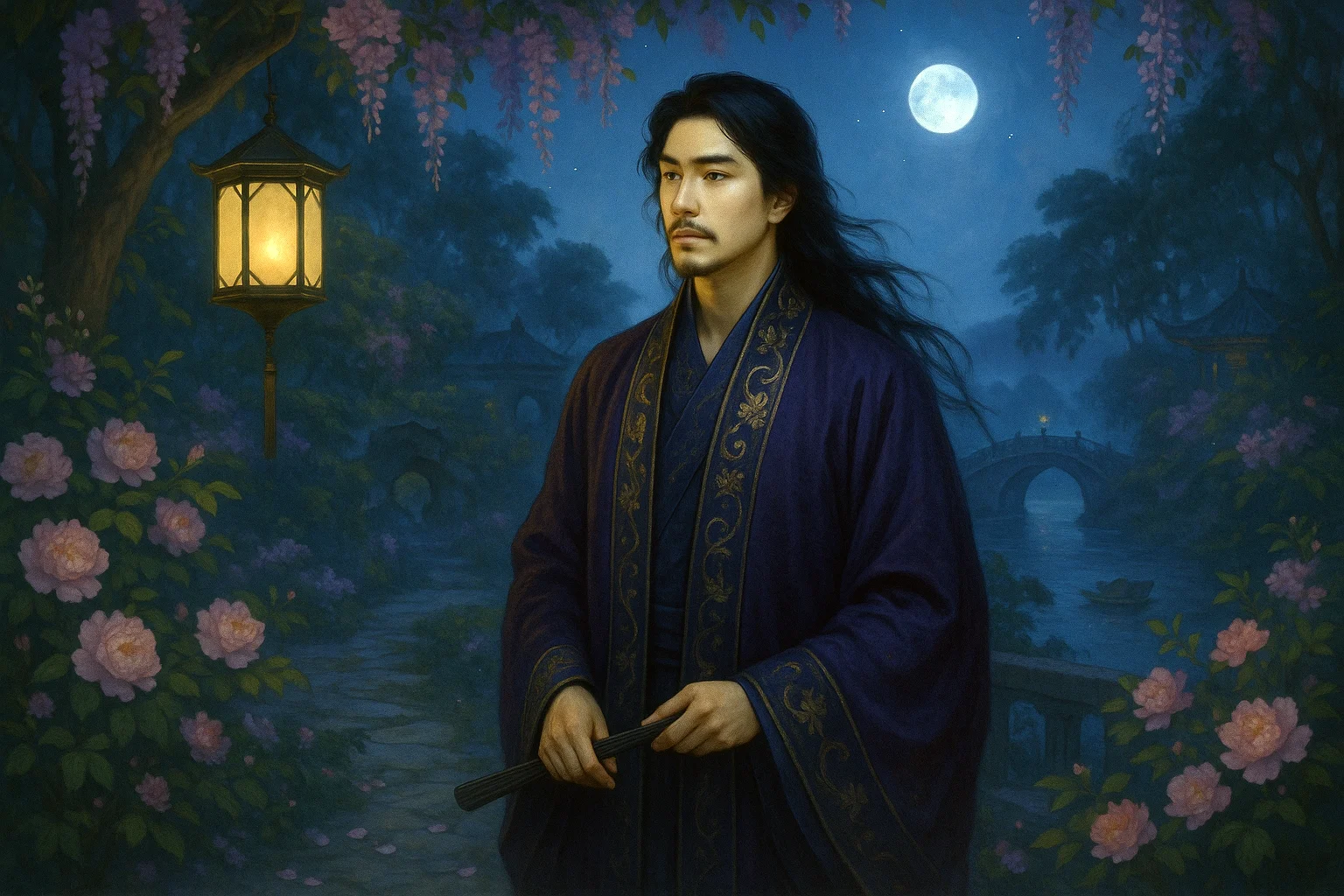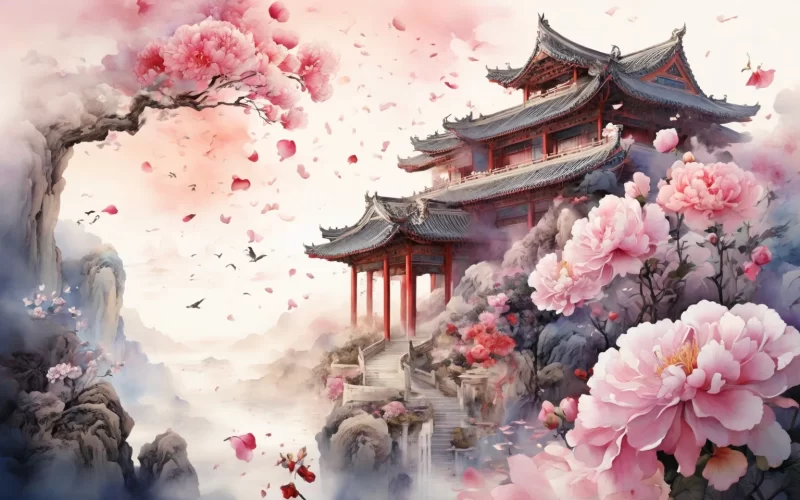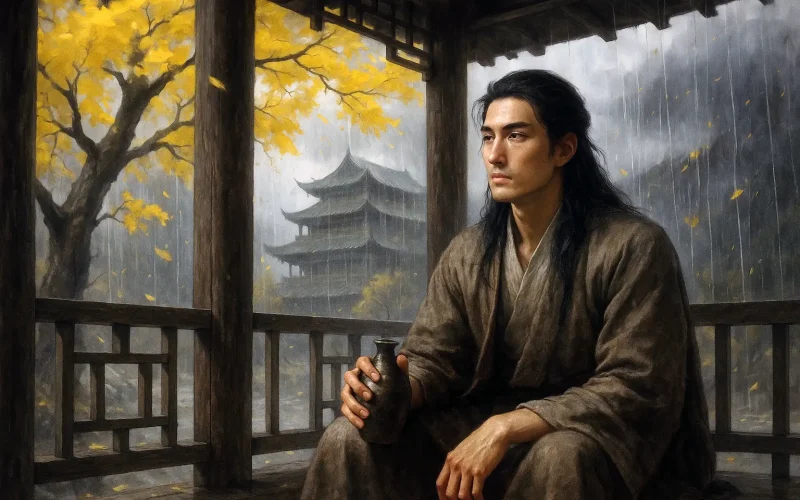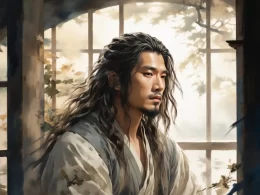Gone is the guest from the Chamber of Rank,
And petals, confused in my little garden,
Zigzagging down my crooked path,
Escort like dancers the setting sun.
Oh, how can I bear to sweep them away?
To a sad-eyed watcher they never return.
Heart's fragrance is spent with the ending of spring
And nothing left but a tear-stained robe.
Original Poem
「落花」
李商隐
高阁客竟去, 小园花乱飞。
参差连曲陌, 迢递送斜晖。
肠断未忍扫, 眼穿仍欲归。
芳心向春尽, 所得是沾衣。
Interpretation
Composed in 846 AD (the sixth year of Huichang era), this poem was written during the poet's forced seclusion in Yongle after political ostracism. Having married Wang Maoyuan's daughter, he faced persecution from the Niu faction. Amid political frustration and personal rootlessness, the poet projects his grief onto falling petals - lamenting both spring's departure and his own thwarted career.
First Couplet: "高阁客竟去,小园花乱飞。"
Gāo gé kè jìng qù, xiǎo yuán huā luàn fēi.
From high towers, guests depart in vain, In my small garden, wild flowers dance in pain.
The unexpected departure ("竟去") echoes the poet's political abandonment, while the chaotic floral movement ("乱飞") visually embodies his disordered state of mind. This parallel structure juxtaposes human rejection with nature's restless response.
Second Couplet: "参差连曲陌,迢递送斜晖。"
Cēncī lián qū mò, tiáodì sòng xié huī.
Strewn unevenly along winding ways they lie, Seeing off the sunset's last lingering sigh.
The petals' irregular distribution ("参差") mirrors the poet's uneven career path, while the extended farewell ("迢递") to fading light symbolizes prolonged political twilight. The couplet's spatial-temporal duality reflects both physical and metaphorical descent.
Third Couplet: "肠断未忍扫,眼穿仍欲归。"
Cháng duàn wèi rěn sǎo, yǎn chuān réng yù guī.
Heart-torn, I can't bear to sweep them clean, Though spring, eye-worn, still dreams to stay, unseen.
The visceral "heart-torn" and optical "eye-worn" create embodied pathos. The paradoxical desire to retain what's already lost reveals the poet's suspended state between acceptance and denial of his political autumn.
Fourth Couplet: "芳心向春尽,所得是沾衣。"
Fāng xīn xiàng chūn jìn, suǒ dé shì zhān yī.
The blossoms' fragrant heart exhausts for spring, Leaving but tear-stained robes as offering.
"Fragrant heart" doubly signifies both floral essence and poetic ideals. The concrete "tear-stained robes" materialize abstract loss, merging political, personal and seasonal grief into one visceral image.
Holistic Appreciation
The poem achieves organic unity between scene and sentiment. Falling petals become objective correlatives for the poet's political marginalization and aging. Its structural progression - from observed departure (guests/spring) through spatial distribution (lanes/sunset) to bodily response (heartbreak/tears) - mirrors the psychological stages of grief. The work's brilliance lies in making transient natural phenomena bear the weight of existential contemplation.
Artistic Merits
- Anthropomorphic Depth: Terms like "fragrant heart" and "longs to stay" create a lyrical symbiosis between human and botanical realms
- Crescendo of Pathos: Emotional intensity escalates geometrically from observation ("unexpectedly") to physical manifestation ("tear-dampened")
- Sensory Interweaving: Visual (sunset), kinetic (swirling petals), and tactile (damp robes) elements fuse into multisensory melancholy
Insights
Beyond personal catharsis, the poem articulates a universal paradox: our deepest attachments become most visible in their dissolution. Like the poet who recognizes spring's value only as it departs, modern readers confront how life's meaning often crystallizes in retrospect. The work suggests that true wisdom lies not in resisting impermanence, but in honoring its teachable moments - a lesson resonating from Tang dynasty courtyards to contemporary mindfulness practices.
Poem translator
Kiang Kanghu
About the poet

Li Shangyin (李商隐), 813 - 858 AD, was a great poet of the late Tang Dynasty. His poems were on a par with those of Du Mu, and he was known as "Little Li Du". Li Shangyin was a native of Qinyang, Jiaozuo City, Henan Province. When he was a teenager, he lost his father at the age of nine, and was called "Zheshui East and West, half a century of wandering".












